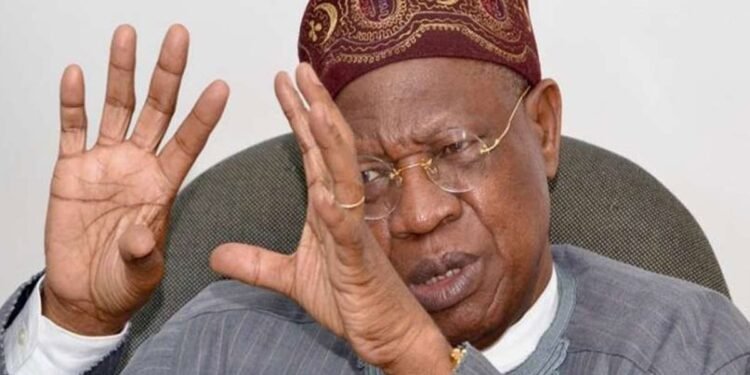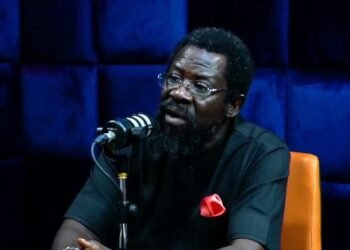Some international media organisations and Think tanks have admitted that they were misinformed about the chances of the Labour Party candidate, Peter Obi, in winning the 2023 Presidential polls.
The Minister of Information and Culture, Alhaji Lai Mohammed, disclosed this in London when he concluded his engagements and meetings with the media houses and Policy Institutes.
The News Agency of Nigeria (NAN) reports that the minister was in Washington and London to defend the legitimacy of the just concluded general elections and correct the imbalance in the skewed narrative which had pervaded the air on the polls.
Addressing newsmen at the Royal Institute of International Affairs, Chatham House, London, where he concluded his engagements, the minister said his mission abroad was very successful.
“We have been able to correct the imbalance in the reporting and we are leaving today with a better feeling. Most of the people we met agreed with us that they had been misinformed and they over-relied on social media hype,” he said.
The minister said not until he educated them, many were not even aware of the requirements to win the presidential election in Nigeria.
He said he pointed out to them that, in addition to plurality of votes, a candidate must have one quarter of votes cast in two thirds of the states which translates to 25 states before being declared winner.
“When we told many of those we met that the Labour Party scored one third of votes in only 15 of the 36 states they were shocked.
“We also told them there is no pathway to victory for either the Peoples Democratic Party (PDP) or Labour Party because they did not meet the requirements to be declared winner,” he said.
Mohammed said he was also able to explain the edge the All Progressives Congress (APC) and its candidate, Sen. Bola Tinubu had over the two other major contenders, Obi and Atiku Abubakar of the PDP, though they all won in 12 states each.
“We explained to them that it is not enough for you to win 12 states but what you scored in other states is also very important. For instance, in addition to winning 12 states, the APC came second in 19 other states with very high scores,” he said.
The minister said he also informed the media houses and think tanks that it was impossible for any party without national spread and grassroots base to win the Presidential election.
Mohammed said he gave the instance of the Labour Party which scored only 315,000 votes in the entire North-East zone and 350,000 in North-West because its candidate was barely known and unpopular there.
He said, whereas in the same North-East and North West, where the APC and its candidate are popular, the vote scored in each of the zones was over two million.
‘Unfortunately, with all these facts on ground, they earlier believed that Obi won the election. This was because of the wrong mindset they had before the polls based on the hyped activities of his followers on social media.
“They also developed the wrong mindset based on skewed and very unrepresentative opinion polls especially by Bloomberg which was uncritically reported by other international media.
”However, I am living in the U.S.A. and the UK satisfied because the wrong perceptions had been corrected and were changing,” he said.
The minister was asked whether the INEC Chairman, Prof. Yakubu Mahmoud, fulfilled his promise made at the Chatham House in January to deliver free, fair, credible polls and let the people’s votes count.
Mohammed said the INEC Chairman walked his talk on the promise.
He explained that contrary to the belief out there, the INEC Chairman did not promise that he was going to transmit elections electronically.
“Our laws today say all election management systems are done physically and manually. There is this misunderstanding about the INEC Result Viewing Centre (IREV).
‘IREV is not about collation and transmission of election. It is a platform for transparency to ensure that whatever is entered into Form EC8A is transmitted into IREV so that everyone can see it,” he said.
NAN reports that while in the U.S. the minister had engagements with international media platforms, including the Washington Post, Voice of America, Associated Press and Foreign Policy Magazine.
He was also at the Reuters News Agency; The Politico, an international political newspaper, and Zenger News, a channel that publishes its contents on Forbes.
Among the international Think tanks he engaged with were the United States Institute of Peace, Hudson Institute, The Atlantic Council and Wilson Institute.
He was also at the Council on Foreign Relations, a well versed think tank on African affairs and foreign relations chaired by a Nigerian, Dr Ebenezer Obadare.
In London, Mohammed engaged with The Economist, The Guardian, African Confidential, The Spectator, Times Radio and Africa Report.
He also met with the Think tanks, Royal African Society, the Royal United Service Institute and the Royal Institute of International Affairs, Chatham House.










